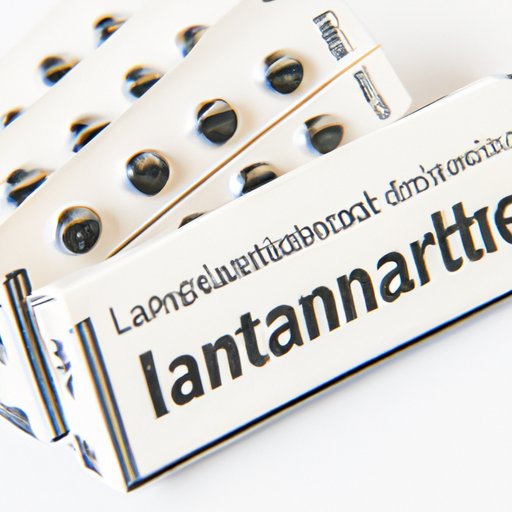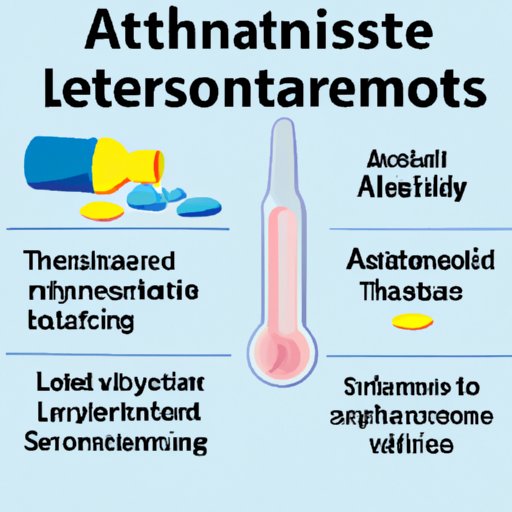
Introduction
If you suffer from allergies, you may have heard of Loratadine, a popular medication for treating allergic reactions. While Loratadine is generally safe and effective, there has been some confusion over whether it can cause drowsiness. In this article, we will explore the question does Loratadine make you sleepy? We will provide a comprehensive guide to understanding Loratadine’s side effects, including its alleged sedative effects, the science behind it, and tips for managing any potential drowsiness. By the end of this article, you will have a better understanding of the medication and feel more confident in taking Loratadine to combat your allergies.
A Guide to Understanding the Side Effects of Loratadine: Debunking the Myth of Drowsiness
One of the most common misconceptions about Loratadine is that it causes drowsiness. In reality, drowsiness is a rare side effect of the medication. Some people may experience drowsiness after taking Loratadine, but it is not typically a major side effect. Most people who take Loratadine will not experience any drowsiness at all.
The actual side effects of Loratadine can vary from person to person. Some people may experience dry mouth, headaches, or stomach discomfort, while others may experience no side effects at all. If you are concerned about potential side effects, it is always a good idea to talk to your doctor.
In some cases, drowsiness may occur after taking Loratadine. This is more likely to happen if you take more than the recommended dose, or if you take it with other medications that can cause drowsiness, such as sleeping pills or alcohol. If you are taking Loratadine and feel drowsy, you should avoid driving or operating heavy machinery until the drowsiness passes.
How Loratadine Works in Your Body: Shedding Light on the Question of Sleepiness
Loratadine is an antihistamine medication that works by blocking the action of histamines in the body. Histamines are produced by the immune system in response to an allergen, such as pollen, pet dander, or dust mites. Histamines cause allergy symptoms such as itching, sneezing, and runny nose.
Antihistamines like Loratadine work to combat allergy symptoms by blocking the action of histamines in the body. This can help to relieve symptoms like itching and runny nose. While antihistamines can be very effective, they can also cause side effects, including drowsiness.
Some antihistamines are more likely to cause drowsiness than others. Loratadine is considered to be a non-drowsy antihistamine, which means it is less likely to cause drowsiness than other antihistamines. However, in some cases, drowsiness may still occur.

The Ins and Outs of Antihistamines: A Comprehensive Look at Loratadine and Sedation
To understand how Loratadine compares to other antihistamines in terms of sedation, it’s important to understand antihistamines in general. Antihistamines work by blocking the action of histamines in the body. There are two types of antihistamines: first-generation and second-generation.
First-generation antihistamines, such as diphenhydramine (Benadryl) and chlorpheniramine (Chlor-Trimeton), are more likely to cause drowsiness than second-generation antihistamines. Second-generation antihistamines, such as Loratadine, cetirizine (Zyrtec), and fexofenadine (Allegra), are considered non-drowsy antihistamines.
While Loratadine is considered a non-drowsy antihistamine, it can still cause drowsiness in some people. It’s important to talk to your doctor if you are concerned about potential side effects of taking Loratadine.
A Case Study of Loratadine and Its Relationship to Drowsiness: What You Need to Know
While drowsiness is a relatively rare side effect of Loratadine, it can still occur in some people. One example of this is a case study of a 25-year-old woman who experienced drowsiness after taking Loratadine for her allergies.
In this case, the woman had taken Loratadine before bed to help with her allergies. She woke up feeling groggy and drowsy, as well as experiencing dry mouth and dizziness. After talking to her doctor, she switched to taking Loratadine in the morning, which helped to alleviate her drowsiness.
There are several factors that may have contributed to this woman’s drowsiness after taking Loratadine. Taking the medication before bed may have contributed to the drowsiness, as well as taking it with other medications or not drinking enough water.
To avoid drowsiness when taking Loratadine, it’s important to take the medication as directed and to talk to your doctor if you have any concerns. Drinking plenty of water can also help to alleviate potential side effects.
Your Complete Guide to Loratadine: Separating Fact from Fiction on Sleepiness Side Effects
There are many misconceptions about Loratadine and its potential side effects. Some people believe that Loratadine causes drowsiness in everyone, while others believe it is completely non-drowsy. The reality is somewhere in between.
Loratadine is considered a non-drowsy antihistamine, but it can still cause drowsiness in some people. However, this is generally a rare side effect. Most people who take Loratadine will not experience any drowsiness at all.
If you are concerned about potential side effects of Loratadine, it’s important to talk to your doctor. They can help you determine if Loratadine is the right medication for you and can provide guidance on how to manage potential side effects.
Does Loratadine Really Make You Tired? The Science Behind the Conjecture
Several studies have been conducted to investigate the link between Loratadine and drowsiness. One study found that Loratadine did not cause significant drowsiness in participants, even at supratherapeutic doses (doses higher than the recommended amount).
Another study found that while Loratadine was generally well-tolerated by participants, some did experience drowsiness and other side effects. However, the study concluded that Loratadine was a safe and effective medication for treating allergies.
Overall, the scientific research suggests that while Loratadine can cause drowsiness in some people, it is generally considered to be a non-drowsy antihistamine. If you are concerned about potential side effects of Loratadine, it’s always a good idea to talk to your doctor.
A Closer Look at Loratadine and Its Effects on Sleep: Unravelling the Truth
While Loratadine is generally considered a non-drowsy antihistamine, it can still have an effect on sleep quality. One study found that Loratadine did not significantly affect participants’ ability to fall asleep or stay asleep, but it did lead to slightly more awakenings during the night.
While this may not be a major concern for most people, if you are already struggling with sleep issues, it’s important to talk to your doctor before taking Loratadine. They can help you determine if Loratadine is the right medication for you and can provide guidance on how to manage potential effects on sleep.
Conclusion
So, does Loratadine make you sleepy? While drowsiness is a potential side effect of the medication, it is generally considered to be a non-drowsy antihistamine. Most people who take Loratadine will not experience any drowsiness at all.
If you are concerned about potential side effects of Loratadine, it’s important to talk to your doctor. They can help you determine if Loratadine is the right medication for you and can provide guidance on how to manage potential side effects.
Remember, Loratadine is a safe and effective medication for combating allergies. While it’s important to be aware of potential side effects, don’t let the fear of drowsiness prevent you from taking the medication you need to feel better. Talk to your doctor if you have any concerns or questions about taking Loratadine.




